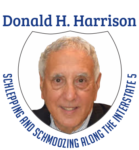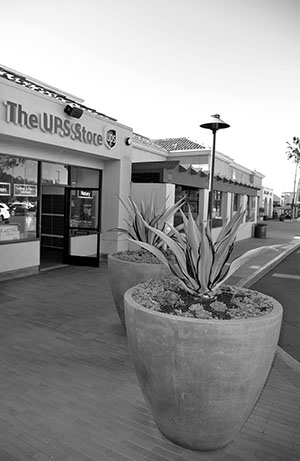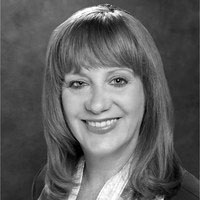 Editor’s Note: This is the 27th Chapter in Volume 2 of Editor Emeritus Donald H. Harrison’s 2022 trilogy, “Schlepping and Schmoozing Along the Interstate 5.” All three books as well as others written by Harrison may be purchased from Amazon.com.
Editor’s Note: This is the 27th Chapter in Volume 2 of Editor Emeritus Donald H. Harrison’s 2022 trilogy, “Schlepping and Schmoozing Along the Interstate 5.” All three books as well as others written by Harrison may be purchased from Amazon.com.
Schlepping and Schmoozing Along Interstate 5, Exit 34 (Del Mar Heights Road): San Diego Outreach Synagogue
From the northbound Interstate 5, take the Del Mar Heights Road exit. Turn right at Del Mar Heights Road. 3525 Del Mar Heights Road is on the right side between El Camino Real and Carmel Country Road.


SAN DIEGO – A traveling synagogue needs to have some place to receive its mail. If you go to the address of the San Diego Outreach Synagogue at 3525 Del Mar Heights Road, you will find yourself in a UPS store that offers various mail services.
Then-Cantor Cheri Weiss started the non-traditional congregation in October 2018, five months after receiving her cantorial ordination from the Academy for Jewish Religion, California, a seminary based in Los Angeles. After two years of further study, she gained her rabbinical ordination and became known as Rabbi-Cantor Cheri Weiss. She gained membership in the San Diego Rabbinical Association as well as the Board of Rabbis of Southern California.
Overall, the process of becoming a cantor and a rabbi took seven years. This involved commuting from San Diego to Los Angeles, taking a full schedule of classes over one very full day a week, and returning to San Diego late at night for most of the five years that she studied for the cantorate. Typically, she left home at 5 a.m. Mondays and didn’t return until 10 p.m. During her commutes, she kept awake by listening to mysteries on audio tapes, which she still enjoys doing. The exceptions to her commute pattern were the semester when she took Sunday classes and the final year when, because of COVID, she took all her classes via Zoom.
Inspired by her good friend, Rabbi Jules King, who leads the Desert Outreach Synagogue in Palm Desert, California, Weiss said she “was attracted to what is called a ‘without-walls’ model to minimize overhead that did not require hefty dues from members or anyone. I only rent space as I need it. I wanted to offer an alternative to those who were interested in finding their own voice but not paying thousands of dollars in dues.”
With the help of her husband Dan, Weiss conducted services one Friday a month, and eventually started doing other events in connection with the various Jewish holidays. “That might be in a person’s home, or we had a huge Passover seder at Morgan Run in Rancho Santa Fe that had almost 100 people,” Weiss said. “Our first High Holy Day services attracted between 60 and 90 people depending on the service. There was a mob scene for Kol Nidre.”

(Family Photo)
The rabbi-cantor chose the songs, prayers, and readings with the idea of making the service accessible. “I use a lot of English,” she said. “I am very attracted to the Reform movement’s siddur (prayer book). I am very attracted to music as an expression of the liturgy, and we have done services that have broken a lot of traditions.”
“Sometimes, I will do a creative service,” she continued. “I will have a theme and I will have some of the basic prayers, but I also ask people to bring poems or stories or something unique that speaks to the theme that I provided. Those were really received well because people could feel that they were participating. I am much more interested in participation than I am in performance.”
Before COVID, the Friday night services were accompanied by potluck dinners, or take-out food, or backyard barbecues, occasionally some cooked by the rabbi-cantor herself. “I really felt that Shabbat has to be about being in community and having a Shabbat meal together,” Weiss said. “I didn’t feel comfortable telling people, ‘Hey, come to the service’ and throwing a dry cookie at them and a thimble full of grape juice and ‘bye-bye.’ It doesn’t speak to me at all. So, pre-COVID, we could have anywhere from 35 to 50 people show up.”
She said she likes to keep her services short, with plenty of music. At San Diego Outreach Synagogue services, her husband Dan played the guitar; Emelia Lopez-Yañez (whose mother Ruth Weber conducts the San Diego Jewish Men’s Choir) was a vocalist; Rocky Smolin played bass, and Diane Benaroya, publisher of L’Chaim San Diego Magazine, played keyboards.
During the worst of COVID, the San Diego Outreach Synagogue went to a Zoom format both for every-Friday night services and extra programming. “That was really a blessing for me,” Weiss said. “We did a program on being Black and Jewish and I had a panel who were Black and Jewish. I am interested in hearing people’s stories because I feel when you listen to their stories, you get to know them on a deeper, more personal level. So, we came up with a program called JED Talk – Jewish Experiences Discussed. We would have two panelists tell their story and then it eas time for questions so we would get to know them.
“Hearing people’s stories is really critical to creating community,” she added. At large congregations’ Shabbat services, Weiss said, congregants typically have time only for superficial conversations with each other. In contrast, when people tell the stories of their Jewish journeys, it lets people shine. “My biggest mission in life is to help people find their own Jewish voice and make Judaism accessible,” she said. “In fact, our tagline is ‘Accessible Judaism.’”
Asked the motivations of the people who attend her congregation, she responded, “I can tell you what they were telling us. First of all, they didn’t want to pay thousands of dollars in dues. They weren’t that active. They didn’t have kids in schools anymore, or it wasn’t for them. Or, they didn’t feel like they mattered. A lot of them had a bad experience in maybe their youth and they never gave Judaism a chance again.”
She added a demurral that traditional congregations are “not always like that. There are plenty of places that are really caring and compassionate and feel like communities. I have been to some nice communities outside of San Diego, and [in San Diego], I belong to Ohr Shalom because we love Rabbi [Scott] Meltzer so much.”
Part of her congregation’s outreach came during High Holy Days of 2020 and 2021 when members “contacted all the hospitals and hospices and retirement communities and offered the links to our High Holy Day services for free. Many took us up on it.
“For me, that is tikkun olam,” said the rabbi-cantor. “I have a CD: Hineni: Music for the High Holy Days that I produced in 2016, that I distributed for free all across the country with JFS (Jewish Family Service) and Federations. It was given to all those people who are home-bound.”
From childhood, Cheri Weiss has been attracted to Judaism and to music. She attended an Orthodox Hebrew day school in Brookline, Massachusetts, through8th grade. She learned to read Torah in Hebrew and Talmud in Hebrew and Aramaic. She supplemented secular high school with Hebrew high school classes that focused on modern Israeli literature and language. She interrupted her theater arts and English language for a year abroad at the Hebrew University of Jerusalem, where one of her teachers was the famed poet Yehuda Amichai. After returning to Wesleyan to complete her undergraduate studies, she spent five years in Israel, where she was married to her first husband, Sam, and where she wrote lyrics in Hebrew and in English. Some of her lyrics were written for Israeli singers who hoped to break into the European music scene. Two songs were translated into Spanish and sung by Sergio Denis of Argentina on one of his albums.
Her first husband prompted the move to the United States and although they subsequently divorced, they remain good friends. In fact, he reads Torah at her congregation.
After settling in Los Angeles, she decided to pursue a bachelor’s degree in music from Cal State Northridge. “Those years turned me from a singer into a musician,” she recalled. “I took four or five years of music theory including music analysis. You are taking ear training, taking music history. You have to take piano; you have to pass a piano efficiency exam. There were musicology classes. It was a lot. It wasn’t just open my mouth and sing, which of course, was a huge part of it. You were really learning the nuts and bolts of music. I loved it. I loved music theory and analysis.”
For her graduate recital, she wrote the music and lyrics for a song cycle that she performed called Shirim l’Emma, “Songs for Emma,” her daughter. I have always been in love with the Hebrew language, always,” she explained. “From day one I felt very connected to the Hebrew language.”
She gave private music lessons in Los Angeles before moving to San Diego County, where she soon obtained a part-time job at Palomar College teaching voice. She also had a private voice studio.
For nine years, Weiss was a congregant at Ner Tamid Synagogue in Poway, where she served as a cantorial soloist. Later she became a member of Congregation Beth El, where she was a cantorial intern for three years. Weiss also helped to lead many Beth El services, conducted a choir that she founded there, and made pastoral visits to congregants. Additionally, she founded the San Diego Jewish Community Choir in 2018 It went on hiatus due to COVID.
“I was very interested in learning how to chant Torah and Haftorah, she said. Her mentor and member of the ritual committee, the late Gene Newman, gave her some life-changing advice. He said that she had sufficient kavanah (spiritual intention) to become a cantor. “Where there is a will there is a way,” he quoted to her.
For Cheri Weiss, that proverb proved to be true.
On May 16, 2022, she notified members and friends of her congregation that she was accepting “the position of spiritual leader of Temple Emanu-El in Honolulu, Hawaii, where I will serve as both rabbi and cantor. Dan and I will be moving there with our two small rescue dogs (Hope & Josie) in mid-July. We will certainly miss all our SDOS friends and San Dieg, which has been our home for over 25 years.”
This time the synagogue with which she is affiliated has its own permanent address. It is 2550 Pali Highway, Honolulu, Hawaii 96817.
Temple Emanu-El is well known for its possession of the Kalakaua Torah, named for King David Kalakaua, the second to last Hawaiian monarch. Left with him for safekeeping by Elias Abraham Rosenberg in 1886, it became the king’s sole possession after Rosenberg died in San Francisco. It was passed down through the royal family, from which it disappeared in the 1930s, only to be discovered decades later. Ravaged by insects, the Torah is unfit for religious use but is kept in a display case in the Reform congregation’s sanctuary – a testament to Jewish history in Hawaii.
*
Donald H. Harrison is editor emeritus of San Diego Jewish World. He may be contacted via donald.harrison@sdjewishworld.com